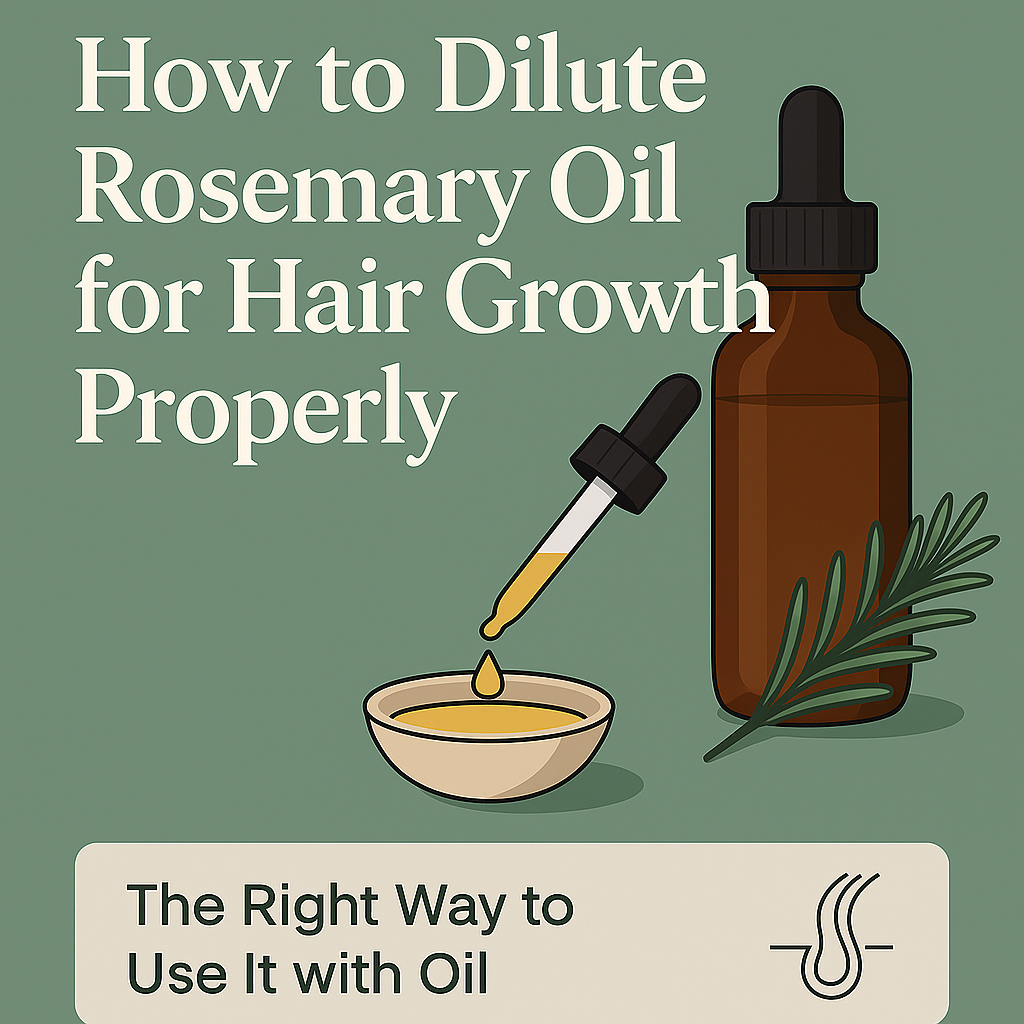How to Dilute Rosemary Oil for Hair Growth Properly

Rosemary oil for hair growth has gained immense popularity among haircare enthusiasts and professionals alike. Its ability to stimulate blood circulation in the scalp, awaken dormant hair follicles, and improve overall hair thickness has made it one of the best rosemary oils for hair growth. However, while rosemary essential oil is highly effective, it must be used properly especially when it comes to dilution.
In this comprehensive guide, we’ll break down the right way to dilute rosemary oil for hair, the best carrier oils to use, and how to incorporate this powerful treatment into your regular routine using only recommended hair oil for hair growth options that are safe and effective.
Why Diluting Rosemary Oil Is Crucial for Hair Care
Pure rosemary essential oil is incredibly potent. Applying it directly to your scalp without dilution can lead to irritation, burning, or even allergic reactions. That’s why it's essential to mix it with a carrier oil to make it safe and beneficial for your scalp and strands.
Key Benefits of Diluting Rosemary Oil Properly:
-
Prevents scalp sensitivity or burns
-
Enhances absorption and efficacy
-
Allows for easier application over larger areas
-
Helps combine with other hair growth oil solutions for added benefits
Using rosemary oil the right way can transform your hair care routine and make it part of your daily or weekly treatment regimen, especially if you’re looking for the best hair oils for growth and thickness in the UK market.
Step-by-Step: How to Dilute Rosemary Oil for Hair Growth
Here’s a simple, step-by-step process to safely dilute rosemary oil for hair growth using natural, effective carrier oils.
1. Choose the Right Carrier Oil
Pick a hairstyle oil that complements your hair type. The best carrier oils for rosemary oil include:
-
Coconut oil: Best for dry or damaged hair
-
Jojoba oil: Ideal for oily scalps
-
Argan oil: Lightweight and rich in vitamin E
-
Castor oil: Excellent for thickness and regrowth
-
Sweet almond oil: Softens and nourishes
These are not just carrier oils they’re powerful hair growth oils in their own right, making them perfect for anyone seeking a boost in volume and density.
2. Measure the Proper Ratio
A safe and effective dilution ratio is:
- 3–5 drops of rosemary essential oil per 1 tablespoon (15ml) of carrier oil
If you're creating a larger batch, stick to about a 2% dilution. This ratio makes it strong enough to be effective without irritating the scalp.
3. Mix Thoroughly
Combine the rosemary oil and carrier oil in a clean glass bottle or container. Shake well before each use to ensure consistency. For long-term storage, keep the mixture in a dark, cool place to protect the essential oils from degrading.
4. Apply to Scalp
Section your hair and apply the mixture directly to your scalp using your fingertips or a dropper. Massage gently for 5–10 minutes. This enhances circulation and ensures better absorption.
5. Leave It On
You can:
-
Leave it for at least 30 minutes before washing
-
Or keep it overnight for a deeper treatment
Wash with a gentle, sulfate-free shampoo. You may follow up with a hair serum or conditioner if desired.
Use this method 2–3 times a week for visible improvements in hair thickness, shine, and strength.
What’s the Best Rosemary Oil for Hair Growth in the UK?
Choosing the right essential oil matters as much as the method of use. If you're looking for the best rosemary oil for hair growth, make sure it’s:
-
100% pure and steam-distilled
-
Free from additives or synthetic fragrances
-
Dermatologically tested or certified organic
UK consumers can find high-quality rosemary essential oil from trusted beauty retailers and natural brands. Pair it with a recommended hair oil for hair growth like cold-pressed castor oil or Moroccan argan oil for the best results.
For people with sensitive scalps, always do a patch test before applying any new oil mixture.
Which Hair Types Benefit the Most from Diluted Rosemary Oil?
No matter your hair type, rosemary oil for hair growth when diluted properly can be a transformative ingredient. But let’s break it down even further:
|
Hair Type |
Ideal Carrier Oil |
Benefits |
|
Fine Hair |
Argan Oil |
Lightweight, adds shine without weighing hair down |
|
Thick Hair |
Castor Oil |
Promotes density, deeply moisturising |
|
Oily Scalp |
Jojoba Oil |
Balances sebum, non-comedogenic |
|
Dry Hair |
Coconut Oil |
Restores moisture, prevents breakage |
|
Curly Hair |
Sweet Almond Oil |
Enhances elasticity, reduces frizz |
Each combination works as an advanced hair growth oil system that targets specific scalp and strand issues while promoting thickness and strength.
How Often Should You Use Diluted Rosemary Oil for Hair Growth?
Consistency is everything when it comes to seeing real results from your rosemary oil for hair growth routine. But overuse can irritate the scalp or lead to product buildup, especially if your scalp is sensitive or your hair is on the finer side.
Recommended Frequency:
-
2 to 3 times per week is ideal for most users.
-
For dry or flaky scalps, start with once a week and gradually increase.
-
Avoid daily use unless advised by a dermatologist, especially if you're using heavier hair growth oils like castor oil as your carrier.
If you're using rosemary oil in a hair serum or lightweight scalp mist, it can be used more frequently just ensure it’s well diluted. Many users in the UK report noticeable improvements in hair texture, scalp health, and reduced shedding after 4–6 weeks of consistent application.
Pair your routine with a gentle, sulfate-free shampoo and avoid using heat-styling tools excessively to give your hair the best chance to grow thicker and healthier. For maximum impact, combine rosemary oil with a recommended hair oil for hair growth tailored to your hair type.

"Can I Mix Rosemary Oil with Other Hair Growth Oils or Serums?"
Absolutely. One of the best things about rosemary oil is its compatibility with other oils and haircare products. It can be added to:
-
Hair growth oil blends for multi-targeted results
-
Lightweight hair serums to add shine and volume
-
Deep conditioning masks for weekly treatments
-
DIY scalp sprays mixed with water or aloe vera
However, always maintain the correct dilution ratio when combining with other oils or serums. Do not mix rosemary essential oil directly into commercial shampoo or conditioners unless they are specifically designed to accommodate essential oils.
This versatility makes rosemary oil one of the best hair oils for growth and thickness, especially for those committed to a natural, effective haircare routine.
Final Thoughts: Dilution Is the Key to Safe, Powerful Hair Growth
Using rosemary oil for hair growth can yield remarkable results but only when diluted properly. With the right carrier oil, consistent application, and proper technique, rosemary oil can significantly improve scalp health, reduce shedding, and support long-term hair density.
If you’re looking to incorporate a powerful, natural solution into your hair routine, consider rosemary oil one of the most affordable and effective options. As a recommended hair oil for hair growth, it's ideal for men and women alike, across all hair types.
External Resources for Further Reading
To deepen your understanding of essential oils and their benefits for hair health, consider these trusted UK-based resources:
-
The National Health Service (NHS) provides general guidance on essential oil safety and how to use them properly.
-
The British Association of Dermatologists offers detailed advice on scalp and hair care practices for various hair types and conditions.



